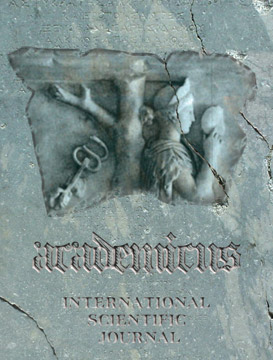Title:
Author(s):
Abstract:
People in different country, may find that globalization and transnationalization of the nation also offer opportunities. Globalization in its literal sense is the process of transformation of local or regional phenomen into global ones. It can be described as a process by which the people of the world are unified into a single society and function together. Supporters of free trade claim that it increases economic prosperity as well as opportunity, especially among developing nations. It also enhances civil liberties and leads to a more efficient allocation of resources. Economic theories of comparative advantage suggest that free trade leads to a more efficient allocation of resources, with all countries involved in the trade benefiting. In general, this leads to lower prices, more employment, higher output and a higher standard of living for those in developing countries. The EU represents one of the greatest experiments in political and economic history. For the first time nations have chosen to surrender aspects of their national sovereignty to a central body that has a responsibility to ensure that they act for the good not only of themselves but of other nations as well. All of us can be part of EU in every single moment by travelling without visas, using euro, making business or applying european law. The EU provides the first example of a truly supranational body where the ambitions of nations curbed by a need to co-operate in order to succeed. This body helped bringing incredible political and economic stability to Europe. I would like to underline the force of globalization movement and the Euro impact, which is now a fact against all arguments.
Keywords:
Globalization, free trade, supranational, european
Full Text PDF:
References:
View complete reference list, click
here
Digital Object Identifier DOI:
The article's content ©Academicus™ Europe and the integration process
by
Dr. (PhD) Arben Shehu
is licensed under a Creative Commons
Attribution-NonCommercial 4.0 International License.
Presented:
October 2010
Included for Publishing:
December 2010
Published:
January 2011,
Volume 2,
Issue 3
Academicus International Scientific Journal is an Open Access Journal. This means that all content is freely available without charge to the user or his/her institution. Users are allowed to read, download, print, search, or link to the full texts of the articles in this journal without asking prior permission from the publisher or the author. This is in accordance with the BOAI definition of open access. Users are obliged to cite the source (Academicus International Scientific Journal) and the author, according to the international citation standards.
To learn more about the OA Policy followed by Academicus ISJ, read Journal Regulations
Academicus
International Scientific Journal
pISSN 2079-3715
eISSN 2309-1088
Address:
Sheshi i Flamurit, Rruga Muze
Al-9401 Vlorë, Albania
Tel: +355 68 60 60 555
info@academicus.edu.al
https://academicus.edu.al



 Scholar
Scholar
 Crossref
Crossref
